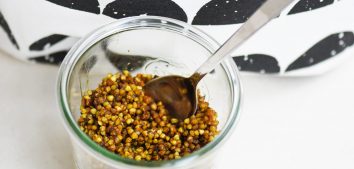
Hashimoto’s Disease Diet – practical tips
Weight gain despite dieting, frequent mood changes, constant feeling of cold and drowsiness. Do you know these problems? They concern many of us, and their cause does not have to be tiredness or excessive stress. The above symptoms may be the symptoms of Hashimoto’s disease, which is becoming an increasingly common health problem of our time. Fortunately, there are several proven ways to help fight these ailments. One of them is a properly selected diet.
Hashimoto’s disease – definition
Hashimoto’s disease is one of the most common causes of hypothyroidism. It occurs much more often in women than in men. In addition to type 1 diabetes or rheumatoid arthritis, it belongs to the group of autoimmune diseases in which our body produces antibodies against its own cells and tissues, attacking them.
As a result of this process, inflammation and gradual damage to the organ occurs. This is also the case of Hashimoto’s disease, where the immune system recognizes its own thyroid cells as foreign and begins to produce antibodies against thyroid-produced proteins (anti-TPO (antibodies against thyroid peroxidase) and anti-TG antibodies (antibodies against thyroglobulin). They cause damage to thyroid cells and impede the production of hormones through this gland. The reasons for the development of the disease are not fully understood.
Symptoms and diagnostics
Let me start with the fact that not all people have symptoms of the disease. In addition, the emerging symptoms are non-specific, which may additionally complicate the diagnosis of the disease.
The most common symptoms of Hashimoto’s disease include:
– dry and rough skin;
– nail fragility;
– hair loss;
– edema;
– drowsiness;
– pressure drop;
– constant tiredness;
– depressed mood and mood swings;
– constipation;
– weight gain.
Diet for Hashimoto’s disease
If you have already been diagnosed with Hashimoto’s disease, remember that an appropriate diet should constitute an important part of your treatment process. A properly balanced menu supports the healing process and significantly alleviates the symptoms of the disease. The diet may also facilitate the maintenance of proper body weight and slow down the inflammatory process. However, it should be remembered that the most important element of therapy is normalizing the level of hormones through the use of appropriate pharmacological treatment.
Below you will find a few diet tips that will help you fight the disease:
-
Go on a weight-loss diet.
In the case of coexisting excess weight or obesity, lowering the caloric value of your diet will help you maintain a healthy weight. On the other hand, it should be remembered that too high an energy deficit may harm you, leading to the impairment of the thyroid and immune system.
-
Eat 5 meals a day.
An important element of a properly selected diet is the regularity of meals consumed. The best choice for you will be eating 5 meals a day. Remember that the last meal should be consumed no later than 2-3 hours before bedtime. Such distribution of energy during the day will protect you from lowering the metabolic rate.
-
Limit your carbohydrate intake. Choose complex carbohydrates.
Due to the occurrence of glucose and insulin homeostasis disorder, which is often present in patients with Hashimoto’s disease, it is recommended to limit the supply of carbohydrates. On the other hand, it is important to choose complex carbohydrates rich in dietary fiber. Remember that an adequate supply of fiber will improve the work of your intestines and help you in the fight against constipation. It is also important to select carbohydrates with a low glycemic index, which will help prevent rapid fluctuations in blood glucose after a meal. At the same time, products that are a source of simple sugars (eg cakes, cookies, sweets) should be reduced.
-
Increase the amount of protein in your diet.
Compared to other nutrients, the body uses more energy for protein metabolism, which can be especially beneficial for people with Hashimoto’s disease. You should also remember that amino acids, such as tyrosine, are essential for the synthesis of thyroid hormones. Choose mainly wholesome protein of animal origin. The source of protein in your diet should be: meat, fish and eggs.
-
Avoid low-fat diets. Increase the intake of omega-3 fatty acids.
Remember that in the case of Hashimoto’s disease, a low-fat diet is not recommended because it may impair the absorption of vitamins and disrupt the immune system. In the case of hypothyroidism, attention should be paid not only to the quantity, but also to the quality of fat consumed. Polyunsaturated fatty acids from the omega-3 family reduce the inflammatory process. In addition, they increase the sensitivity of tissues to hormones. A good source of fatty acids with anti-inflammatory effects are, above all, oily sea fish, linseed oil, walnuts and avocado. Limit the intake of saturated fatty acids and animal fats. Choose mainly vegetable fats.
-
Remember about the sufficient supply of iodine
Iodine is essential for the proper functioning of the thyroid gland. On the other hand, its excess may exacerbate the symptoms of the disease and the auto-aggression process. Therefore, it is important to maintain the right balance in the consumption of this mineral. The products rich in iodine include: marine fish, seafood, certain kinds of mineral water and kitchen salt (iodized).
-
Increase your selenium intake.
Apart from iodine, selenium is another element necessary to support proper thyroid function. It is a component of the enzyme, which is involved in the transformation of the T4 to T3 hormone. Moreover, it alleviates the inflammatory process and has antioxidant properties. Selenium-rich products include Brazil nuts, fish, seafood and eggs.
-
Iron – a mineral essential in the diet of people with Hashimoto’s disease.
Iron is another important element in the diet of people with hypothyroidism. It is a component of iodinating peroxidase – an enzyme involved in the synthesis of thyroid hormones. Iron deficiency causes the inhibition of hormone production and contributes to the increased secretion of TSH. For the above reasons, people with Hashimoto’s disease should pay special attention to enriching the diet with this element. As a good source of iron, I can recommend red meat, liver, egg yolk, whole-grain cereals, and green leafy vegetables.
-
Don’t forget about zinc.
The studies carried out so far have shown that as the concentration of zinc in the serum decreases, the titre of antithyroid antibodies increases. Zinc is a component of the T3 receptor proteins, so its deficiency affects the impaired binding of this hormone, which then translates into a reduced concentration of thyroid hormones. In addition, insufficient amount of zinc in the body reduces the rate of hormone metabolism. The recommended zinc dietary sources include: whole grains, meat and eggs.
-
Consider vitamin D supplementation.
Vitamin D deficiency often occurs in patients with Hashimoto’s disease. That is why it is worth considering using this vitamin supplement. Although vitamin D may be formed in the skin under the influence of solar radiation, from September to April the amount of sunlight reaching our latitude is too small to cover the daily requirement for this vitamin. Unfortunately, food products are usually low in vitamin D. One good source of this vitamin is greasy sea fish and fish oil.
-
Don’t forget about antioxidants.
Remember that vitamins such as C, E, and carotenoids have antioxidant properties that can alleviate the ongoing inflammatory process in the body. For this reason, one should remember about their adequate supply also in people with Hashimoto’s disease. The easiest way to cover the demand for vitamins is to follow a varied diet. Remember that the more colorful your plate is, the lower the risk of nutritional deficiencies.
-
Give up dairy products
Due to the immunological background of Hashimoto’s disease and inflammation in the body, the diet should be anti-inflammatory and eliminate potential food allergens. In the case of dairy products, it is worth observing the reactions of the organism after their consumption due to their possible allergenic properties. If you notice disturbing symptoms after eating cow’s milk, consider eliminating it from the diet. Instead, replace it with vegetable drinks (eg rice, almond, coconut).
-
Consider eliminating gluten.
People with Hashimoto’s disease often have intolerance to gluten. The studies have also shown that a gluten-free diet can have a positive effect on the course of the disease by mitigating the inflammatory processes in the body. The reason for this is that gliadin (one of the gluten fractions) has a very similar structure to the thyroid tissue. Therefore, in some cases, after ingesting gluten, the body may produce antibodies against gliadin. Unfortunately, these antibodies can also attack the thyroid gland. Therefore, observe how your body reacts after eating products with wheat, rye, barley or oats. If you notice any ailments, you may consider performing tests to rule out celiac disease and if the result is positive you should eliminate gluten from the diet.
-
Be careful with soy.
Studies showed that in patients with hypothyroidism, soy protein significantly reduces the absorption of drugs and makes it necessary to increase their dose. Therefore, if you suffer from Hashimoto’s disease, consider eliminating soy and its products from your diet.
-
What about cruciferous vegetables?
Cruciferous vegetables, such as cauliflower, broccoli, brussels sprouts, kale are the source of goitrogens. These substances may bind to iodine and thus impede the synthesis of thyroid hormones. I will comfort you – there is no need to completely eliminate these vegetables from your diet. Cooking vegetables can significantly reduce the content of volatile substances. However, remember to cook vegetables without a lid.
-
Avoid highly processed products.
Your diet should be based on natural products, least processed. Avoid products containing a range of aromas, dyes or preservatives.
And finally, remember that in the case of Hashimoto’s disease, it is not recommended to follow very restrictive diets. They can cause additional disruption of the thyroid and immune system, as well as lead to a slower metabolic rate.
Bibliography:
- Asik M, Gunes F, Binnetoglu E, et al. Decrease in TSH levels after lactose restriction in Hashimoto’s thyroiditis patients with lactose intolerance. Endocrine. 2014;46:279-284.
- Fruzza AG, Demeterco-Berggren C, Jones KL. Unawareness of the effects of soy intake on the management of Congenital Hypothyroidism. Pediatrics. 2012;130:e699-e702.
- Krysiak R, Szkróbka W, Okopień B. The Effect of Vitamin D on Thyroid Autoimmunity in Levothyroxine-Treated Women with Hashimoto’s Thyroiditis and Normal Vitamin D Status. Exp Clin Endocrinol Diabetes. 2017;125:229-233.
- Liontiris MI, Mazokopakis EE. A concise review of Hashimoto thyroiditis (HT) and the importance of iodine, selenium, vitamin D and gluten on the autoimmunity and dietary management of HT patients. Points that need more investigation. Hell J Nucl Med. 2017;20:51-56.
- Przybylik-Mazurek E, Zagrodzki P, Kuźniarz-Rymarz S, Hubalewska-Dydejczyk A. Thyroid disorders-assessments of trace elements, clinical, and laboratory parameters. Biol Trace Elem Res. 2011;141:65-75.
- Tuhan H, Işık S, Abacı A, et al. Celiac disease in children and adolescents with Hashimoto Thyroiditis. Turk Pediatri Ars.2016;51:100-105.










Comments No Comments
Join the discussion…